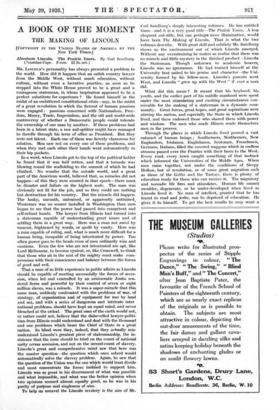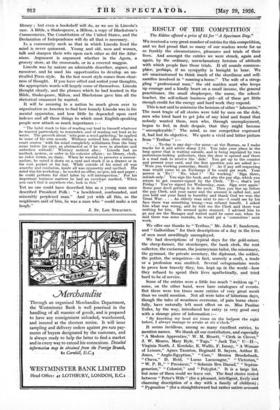A BOOK OF THE MOMENT
New York Times.] Abraham Lincoln. The Prairie Years. By Carl Sandburg. (Jonathan Cape. 2 vols. £2 2a. net.)
MR. LimoLses personality has always presented a problem, to the world. How did it happen 'that an oafish country lawyer from the Middle West, without much education, without culture, without even a lucrative practice, as soon as he stepped into the White House proved to be a great and a courageous statesman, in whom inspiration appeared to be a perfect substitute for experience ? He found himself in the midst of an embittered constitutional crisis—nay, in the midst of a great revolution in which the fiercest of human passions were engaged : passions concerned with Nationalism, Free- dom, Money, Trade, Imperialism, and the old and world-wide controversy of whether a Democratic people could tolerate the ownership of one man by another. If these problems had been in a latent state, a raw rail-splitter might have managed to dawdle through his term of office as President. But they were not latent. Each one of them was fiercely clamorous for solution. Men saw red on every one of these problems, and when they met each other their hands went automatically to their hip pockets.
In a word, when Lincoln got to the top of the political ladder he found that it was half rotten, and that a tornado was blowing round the scaffolding to the summit of which he had climbed. No wonder that the outside world, and a great part of the American world, believed that, as miracles did not happen—of this they were assured in that epoch—there must be disaster and failure on the highest scale. The man was obviously not fit for the job, and so they could see nothing but destruction for his country. But the miracle did happen. The lanky, uncouth, untrained, or apparently untrained,
Westerner was no sooner installed in Washi ton than men began to see that the power had passed into competent and self-reliant hands. The lawyer from Illinois had turned into a statesman capable of understanding great issues and of settling them in a great way. Here was a man not awed by rumour, frightened by words, or spoilt by vanity. Here was a man capable of ruling, and, what is much more difficult for a human being, incapable of being intoxicated by power. Too often power goes to the heads even of men ordinarily wise and cautious. Even the few who are not intoxicated are apt, like Lord Melbourne, to become cynical, or, like Cromwell, to think that those who sit in the seat of the mighty must make com- promises with their consciences and balance between the forces of good and evil.
That a man of so little experience in public affairs as Lincoln should be capable of meeting successfully the forces of seces- sion, when led and controlled by an aristocratic Junta ren- dered fierce and powerful by their control of seven or eight million slaves, was a miracle. It was a super-miracle that this same man, suddenly confronted with the problems of war, of strategy, of organization and of equipment for war by land and sea, and with a series of dangerous and intricate inter national problems, should have kept an equal mind, and never blenched at the ordeal. The great ones of the earth would not, or rather could not, believe that the dishevelled lawyer-politi- cian from Illinois could understand and deal with the thousarpd and one problems which beset the Chief of State in a great nation. So blind were they, indeed, that they actually mis- understood Lincoln's greatest piece of statesmanship, the in- sistence that the issue should be tried on the count of national unity versus secession, and not on the second count of slavery. Lincoln's great and comprehensive mind saw that here was the master question—the question which once solved would automatically solve the slavery problem. Again, he saw that the question of the Union was the one which would least divide and most concentrate the forces inclined to support him. Lincoln was as great in his discernment of what was possible and what impossible, and what was the better opinion when two opinions seemed almost equally good, as he was in his purity of purpose and singleness of aim.
To help as unravel the Lincoln mystery is the aim of Mr. Carl Sandburg's deeply interesting volumes. He has entitled them—and it is a very good title—The Prairie Years. A less eloquent sub-title, but one perhaps more illuminative, would have been The Making of Lincoln. That is what the two volumes describe. With great skill and subtlety Mr. Sandburg shows us the environment out of which Lincoln emerged. Without any overstraining he makes us realize that there was no miracle and little mystery in the finished product—Lincoln the Statesman. Though unknown to academic bowers, Lincoln was no ignoramus. He had trained himself at the University best suited to his genius and character—the Uni- versity formed by his fellow-men. Lincoln's parents went West, and Lincoln " grew up with the West " if ever a man did.
What did this mean ? It meant that his boyhood, his youth, and the earlier part of his middle manhood were spent under the most stimulating and exciting circumstances con- ceivable for the making of a statesman in a dynamic com- munity. Great forces, great hopes, and great aspirations were stirring the nation, and especially the State in which Lincoln lived, and these endowed those who shared them with power and wisdom. The men who made Illinois made themselves men in the process.
Through the places in which Lincoln lived poured a vast cataract of human beings ; Southerners, Northerners, New Englanders, Irishmen, Englishmen, Scotsmen, Frenchmen, Germans, Italians, filled the covered waggons which in endless streams passed over the Prairies with their faces to the West. Every road, every town caught something of that instinct which informed the Universities of the Middle Ages. When men came together, not under the conditions of Sleepy Hollow, but of revolution, or of some great migration such as those of the Goths and the Tartars, there is plenty of education ready for those who can receive .it. The migratory and nomadic life fires and stimulates. Human life cannot moulder, degenerate, or be under-developed when lived as Lincoln lived it. No man of intellect, granted that he has learnt to read and write, can be deprived of education. He gives it to himself. To get the best results he may want a
library ; but even a bookshelf will do, as we see in Lincoln's case. A Bible, a Shakespeare, a Milton, a copy of Blackstone's Commentaries, The Constitution of the United States, and the
Declaration of Independence will do all thatis necessary. , In a community such as that in which Lincoln lived the mind is never quiescent. , Young and old, men and women, talk and sharpen their wits upon each other as did the Athe- nians. Argument. is argument whether in the Agora, a grocery store, at the crossroads, or in a covered waggon.
Lincoln was by nature an admirable describer, arguer, and raconteur, and, he used his opportunities to develop an un-
rivalled Press style. In the last resort style comes from clear- neSs of thought. _ If you have sifted and sorted your thOughts, the appropriate words will largely come of themselves. Lincoln thought clearly, and the phrases which he had learned in the Shakespeare„Milton, and Blackstone gave him all the rhetorical ornament he wanted. • - It will be amusing to a nation to much given over to organization as America to find how homely Lincoln was in his mental apparatus, and _how little he depended upon card indexes and all those things to which most English-speaking
people now attach so much, importance " The habit stuck to him of reading out loud to himself whatever he wanted particularly to remember, and of reading out loud as he -wrote. The proverb about``wits gone a-wool-gathering,' he applied to some of his own moods. Whitney noticed him often during a court session with his-mind completely withdrawn from the busy ,scene before his eyes, as abstracted_as if he were in absolute and unbroken solitude.' Whitney noticed also ; Lincoln had no 'method; system, or order in his exterior affairs ; no library, clerk, no index -rerum, no diary. When he wanted to preserve a memor- .andtim, he noted it down on a card and stuck it in a drawer or in his vest pocket or his hat. While outside of his mind all was anarchy and confusion, inside all was symmetry and method. His mind was his workshop ; he needed no office, no pen; ink and paper ; he could _perform his chief labor- by self-introspection.' For his important business matters he had an envelope marked, When you can't find it anywhere else, look in this.' "
Yet no one could have described him as a young man once described President Polk : " a bewildered, confounded, and miserably perplexed man." And yet with all this, as the .
J. ST. LOE STRACHEY.











































 Previous page
Previous page